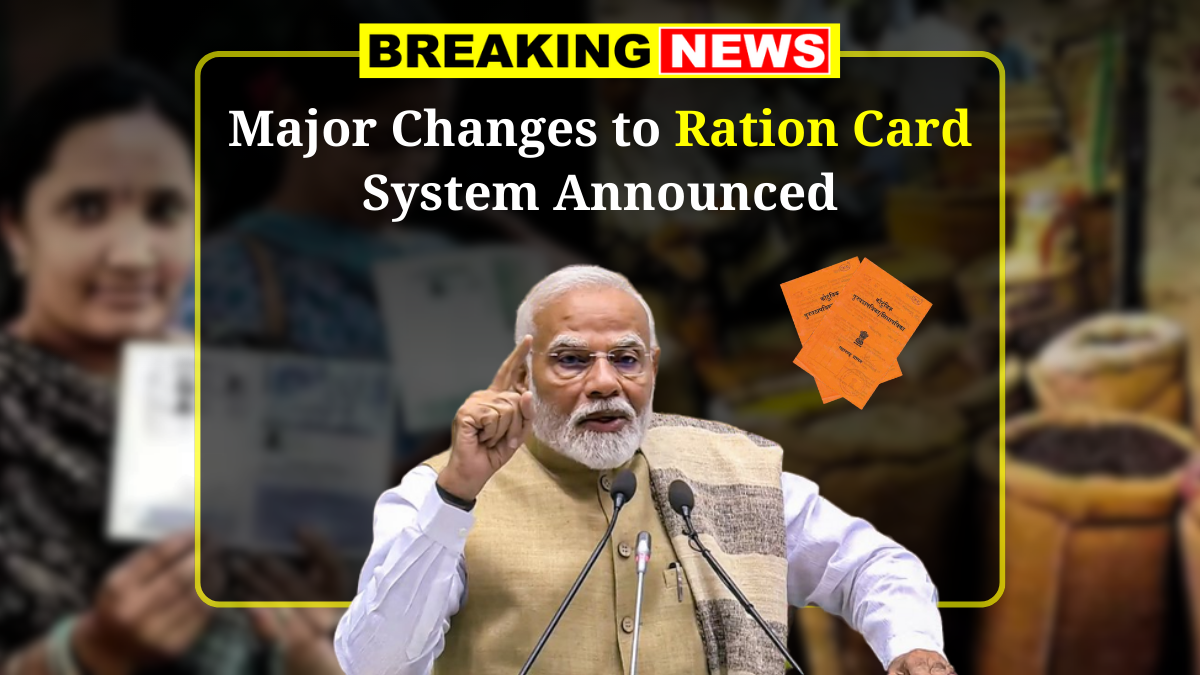Ration Card Rules – The Indian government is bringing in some big changes to the ration card system starting June 27. These updates will affect everyone who has a ration card—whether you’re BPL, APL, or under any other category. The main aim is to make things more transparent, reduce fraud, and ensure only eligible people receive the benefits under the Public Distribution System (PDS). If you or your family members have a ration card, it’s important to understand what’s changing and how it could affect you.
Why the Ration Card Guidelines Are Changing
The move to update the ration card rules comes from years of dealing with fake or duplicate cards that were misused. Because of these loopholes, many truly deserving families were missing out. Now, with a stronger push towards digitization and transparency under the Digital India mission, the government wants to make sure that subsidies are only going to the right people. Linking Aadhaar, using biometric verification, and conducting regular checks are all part of this effort to clean up the system.
What’s New in the Ration Card Rules
One of the biggest changes is that Aadhaar linking is now a must for all family members listed on the ration card. That means everyone—kids and adults—must have their Aadhaar number connected to the card. Biometric authentication is also required whenever someone collects rations. The government will now regularly verify ration cardholders, and anyone found to be ineligible or no longer alive will have their cards canceled. Families with a higher income than the allowed limit may also lose their eligibility. Additionally, the entire application and complaint process has been upgraded online for easier access and tracking.
Who Will Be Affected and How
Different categories of ration cardholders will be impacted in different ways. BPL families will need to provide income proof and undergo yearly verification, while APL holders may be at risk of losing their card if their income exceeds the new threshold. Those under the Antyodaya Anna Yojana (AAY) will be reassessed to confirm their poverty status. Priority households must update details like family size and income every year.
Migrant workers are allowed to use their ration cards across India thanks to the One Nation One Ration Card initiative but will need to do biometric authentication. New applicants will go through a more thorough background check, and any ineligible households will be removed from the system unless they can appeal with valid documents.
How to Link Aadhaar to Your Ration Card
To link Aadhaar, you’ll need to visit your nearest ration shop or PDS center. Bring photocopies of your Aadhaar and ration card and complete biometric verification (e-KYC). Once it’s done, you’ll get an SMS confirming the linking. If you don’t complete this step, you might lose your ration benefits.
Changes to Who Qualifies for a Ration Card
The eligibility rules for ration cards have also been revised. For instance, in Uttar Pradesh, if your family earns more than ₹2,00,000 a year or owns a car or AC, you might no longer qualify. Other states like Maharashtra, Bihar, and Tamil Nadu have different income and property limits. If your financial condition has improved recently, the government now expects you to voluntarily surrender your ration card. Failing to do so could result in penalties.
Applying and Raising Issues Just Got Easier
Thanks to new digital tools, applying for a ration card or making changes has become simpler. All you have to do is visit your state’s official Food and Civil Supplies website, fill in the online form, upload the required documents like Aadhaar, income proof, and residence certificate, and submit. You can also track your application status online. In case of any issues, improved grievance redressal systems are now in place. States have 24/7 helplines, SMS and email alerts, and even chat support on some websites. These updates are meant to make the entire process more user-friendly and efficient.
When Will These Rules Be Implemented in Your State
The new rules officially kick in on June 27, but some states are offering short grace periods. For example, Delhi has extended the compliance deadline to July 15, while Maharashtra is going ahead from June 30. Tamil Nadu, Bihar, and Rajasthan have their own cut-off dates. Make sure to check your state’s official portal or helpline to avoid missing any deadlines.
What Happens If You Don’t Follow the New Rules
If you ignore these new rules or give false information, the consequences could be serious. Your ration card might be suspended or canceled, and if you’ve wrongly received benefits, the government can recover those amounts. There may even be legal action under the Essential Commodities Act. So, it’s better to stay on the safe side by updating your details and complying with the guidelines as soon as possible.
Disclaimer
The information provided in this article is for general awareness purposes only. Readers are advised to verify the latest updates through their respective state government portals or official helplines, as rules may vary slightly from one state to another.




